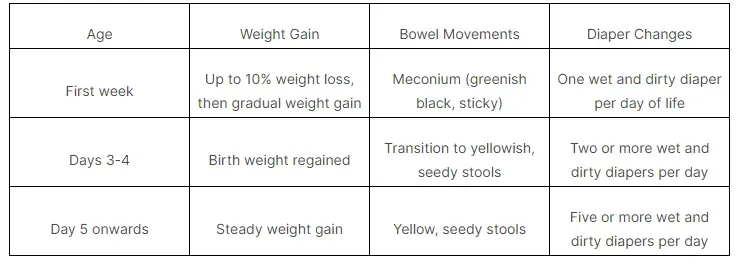First Feeding After Birth 101: What You Need to Know
What are the benefits of the first feeding after birth?
The first feeding after birth, typically breastfeeding, provides crucial colostrum rich in antibodies and nutrients that boost the newborn's immune system, aid in digestion, and promote bonding between mother and child. This first feeding sets the foundation for a healthy start in life.

Key Highlights
- The first feeding after birth is crucial for establishing breastfeeding and initiating milk supply.
- Skin-to-skin contact with your newborn right birth is important for bonding and stimulating the release of colostrum, the first milk.
- Proper latching is essential for successful breastfeeding and preventing sore nipples.
- Newborn babies have their own hunger cues that indicate when they need to be fed.
- Formula feeding can be an alternative to breastfeeding, but it's important to choose the right formula and follow safe preparation and storage practices.
- It's common to encounter feeding challenges such as latching issues and concerns about milk supply, but there are ways to overcome them with support and guidance.

Introduction
The first week after giving birth can be an exciting and overwhelming time for new parents, especially if it's their first time experience with breastfeeding. It's normal to have mixed emotions and feel unsure about what to expect. But the most important thing to focus on during this time is establishing a strong foundation for feeding your newborn. The first feeding after birth plays a crucial role in initiating breastfeeding and ensuring your baby gets the nutrients they need.
Breastfeeding provides numerous benefits for both the baby and the mother. It helps strengthen the bond between mother and baby, provides essential nutrients and antibodies for the baby's development, and can even have long-term health benefits. However, it's important to remember that not all mothers are able to breastfeed for various reasons, including the need to return to work or separate from their babies. In such cases, formula feeding can be a suitable alternative for new mothers.
In this blog, we will discuss everything you need to know about the first feeding after birth, including the importance of early feeding, skin-to-skin contact, breastfeeding basics, formula feeding fundamentals, overcoming common feeding challenges, feeding frequency and schedule, and signs that your baby is getting enough. We will also address frequently asked questions to provide additional clarity on this topic. By understanding the key details and having the right support, you can ensure a smooth transition into feeding your newborn and promote their health and well-being.

Preparing for the First Feed
Before the first feed, it's essential to prepare yourself and your baby for a successful breastfeeding experience. The first breastfeed should ideally take place within the first hour after childbirth. This timing is crucial as it allows your baby to initiate the production of milk and establishes the bond between you and your baby. Skin-to-skin contact is highly recommended during this time as it promotes warmth, comfort, and the release of oxytocin, also known as the "love hormone," which helps with milk production. Having a lactation consultant or healthcare professional present can provide valuable guidance and support to ensure a proper latch and address any concerns or difficulties that may arise.
Understanding the Importance of Early Feeding
Early feeding, especially within the first hour after birth, is crucial for both the baby and the mother. It helps establish breastfeeding and initiates the production of colostrum, the first milk rich in antibodies, essential nutrients, and immune-boosting properties. This early milk is often referred to as "liquid gold" due to its important role in protecting the baby against infections and promoting their overall health and development. Additionally, early feeding helps stimulate the release of oxytocin, which aids in uterine contraction, reducing the risk of postpartum hemorrhage. By prioritizing early feeding and providing your baby with a small amount of colostrum at each feed, you are setting the stage for a successful breastfeeding journey and providing your baby with the best possible start in life.

Skin-to-Skin Contact Right After Birth
Skin-to-skin contact immediately after birth is highly beneficial for both the baby and the mother. It involves placing the baby on the mother's chest, allowing them to feel the warmth and hear the familiar heartbeat. This contact promotes bonding, regulates the baby's body temperature, and helps stabilize their breathing and heart rate. Skin-to-skin contact also encourages the baby's natural instinct to find the breast and self-attach, known as the "breast crawl." This process facilitates the release of oxytocin, which stimulates milk production and enhances the mother's overall well-being. It's important to prioritize skin-to-skin time in the first hour after birth, even if there are complications, and continue it as much as possible in the days and weeks that follow. This intimate connection creates a nurturing environment for breastfeeding and strengthens the emotional bond between mother and baby.
Breastfeeding Basics
Breastfeeding provides unique benefits to both the baby and the mother. Breast milk contains essential nutrients, antibodies, and enzymes that support the baby's growth, development, and immune system. It also promotes bonding and emotional connection between the mother and the baby. Establishing a good milk supply is crucial for successful breastfeeding. It's important to seek guidance from a lactation consultant or healthcare professional to ensure proper latching, positioning, and milk transfer. They can provide valuable advice, address any concerns, and offer support throughout your nursing journey.
How to Ensure Proper Latching
Proper latching is essential for successful breastfeeding and preventing sore nipples. When your baby latches onto the breast, their mouth should be wide open, covering a significant portion of the areola (the dark area around the nipple). This allows them to take in both the nipple and a portion of the breast tissue. The latch should feel comfortable, with a tugging sensation rather than pain. If you experience any discomfort or difficulty with latching, it's important to seek help from a lactation consultant or healthcare professional. They can guide you on proper positioning, technique, and ways to improve the attachment and latch, ensuring an optimal breastfeeding experience for both you and your baby.
Recognizing Your Baby's Hunger Signals
Recognizing your baby's hunger signals is essential for responsive feeding. Newborn babies communicate their hunger through various cues, such as stirring from sleep, opening their eyes, turning their head towards stimulation, and making sucking or smacking noises. These cues indicate that your baby is ready to be fed. It's important to respond promptly to these signals and offer the breast or bottle to meet their needs. Crying is a late sign of hunger, and it's best to initiate feeding before your baby reaches this point. By becoming familiar with your baby's hunger cues, you can establish a feeding routine based on their individual needs and promote a healthy feeding relationship.
Formula Feeding Fundamentals
Formula feeding can be a suitable alternative to breastfeeding for various reasons. It's essential to choose the right infant formula that meets your baby's nutritional needs. Consult with your healthcare professional or pediatrician to determine the most suitable formula for your baby. Proper preparation and safe bottle feeding practices are crucial to ensure your baby's health and well-being. It's also recommended to provide vitamin D supplements to formula-fed babies, as breast milk may not contain sufficient amounts of this essential nutrient. Following proper guidelines and seeking professional advice can help ensure a smooth transition to formula feeding and promote your baby's growth and development.
Choosing the Right Formula
Choosing the right formula milk for your newborn is an important decision. There are various types of formula available, including cow's milk-based, soy-based, and specialized formulas for specific dietary needs. It's best to consult with your healthcare professional or pediatrician to determine the most suitable formula for your baby. They can consider factors such as your baby's age, any existing allergies or dietary restrictions, and any specific nutritional requirements. It's essential to follow the preparation instructions provided by the formula manufacturer and ensure proper hygiene when preparing and storing formula. By choosing the right formula and following safe practices, you can provide your baby with the nutrition they need for healthy growth and development.
Preparing and Storing Formula Safely
Proper preparation and storage of formula are important to ensure your baby's health and safety. Always follow the instructions provided by the formula manufacturer for mixing and preparing formula. Use clean, sterilized bottles and nipples to minimize the risk of contamination. It's important to prepare formula just before feeding and discard any unused formula after one hour. If you need to store prepared formula, refrigerate it immediately and use it within 24 hours. Avoid reheating formula multiple times, as this can increase the risk of bacterial growth. When bottle feeding, ensure that the temperature of the formula is appropriate for your baby's comfort. Testing the temperature on your wrist or the back of your hand can help ensure it's not too hot. By adhering to proper preparation and storage practices, you can provide your baby with safe and nutritious formula feeding.
Overcoming Common Feeding Challenges
Breastfeeding can come with its own set of challenges, but with the right support and guidance, many of these challenges can be overcome. Some common challenges include latching issues, sore nipples, concerns about milk production, and recovering from a caesarean section. It's important to seek help from a lactation consultant or healthcare professional if you experience any difficulties. They can provide valuable advice, strategies, and support to address these challenges and ensure a successful breastfeeding journey. Remember that every mother and baby are unique, and with patience, practice, and support, you can overcome these challenges and establish a fulfilling breastfeeding relationship.
Dealing with Latching Issues
Latching issues can be a common challenge when breastfeeding. If you experience difficulties with your baby's latch, it's important to seek help from a lactation consultant or healthcare professional. They can assess your baby's latch, provide guidance on proper positioning and technique, and address any underlying issues that may be contributing to the problem. Having a support person, such as your partner or a close family member, can also provide assistance and encouragement during this time. Remember that latching may take practice and patience, but with the right support, you can overcome latching issues and establish a comfortable and successful breastfeeding routine.
Managing Supply Concerns
Concerns about milk supply can be a common worry for breastfeeding mothers. It's important to remember that milk supply is typically based on supply and demand. The more your baby breastfeeds, the more milk your body will produce. However, if you have concerns about your milk supply, it's important to seek guidance from a lactation consultant or healthcare professional. They can assess your baby's feeding patterns, provide guidance on increasing milk supply, and offer support and strategies such as using a breast pump to stimulate milk production. Remember that every mother's milk supply is unique, and with proper support and guidance, you can navigate any supply concerns and ensure your baby receives the nourishment they need, even if it means using a dummy or bottle temporarily.
Feeding Frequency and Schedule
Feeding frequency and schedule can vary for newborn babies, especially in the first few weeks of life. Newborns have small stomachs and need to feed frequently to meet their nutritional needs. It's common for babies to feed anywhere from 8 to 12 times or more in a 24-hour period. The feeding frequency can vary throughout the day and night, with some periods of more frequent feeding, especially during growth spurts. It's important to follow your baby's hunger cues and feed on demand rather than adhering strictly to a schedule. By responding to your baby's needs and allowing them to feed when hungry, you can establish a feeding routine that meets their individual needs.
How Often to Feed Your Newborn
The feeding frequency for newborn babies can vary based on their individual needs. It's common for newborns to feed at least 8 to 12 times in a 24-hour period, which can include both day and night feedings. However, it's important to note that every baby is different, and some may feed more frequently than others. It's best to follow your baby's hunger cues and offer the breast whenever they show signs of being hungry. These cues may include stirring from sleep, opening their eyes, turning their head towards stimulation, and making sucking noises. By feeding your baby on demand, you can ensure they receive the nourishment they need and establish a healthy breastfeeding relationship. Newborns who are being fed formula may consume about 2-3 ounces every 2-4 hours, but should not go more than 4-5 hours without feeding.
Understanding Your Baby's Feeding Cues
Understanding your baby's feeding cues is important for responsive feeding and meeting their individual needs. Babies communicate their hunger through various cues, such as stirring from sleep, opening their eyes, turning their head towards stimulation, and making sucking or smacking noises. It's important to respond promptly to these cues and offer the breast or bottle to meet their needs, taking into account their reflexes such as rooting, suckling, and swallowing. Crying is a late sign of hunger, and it's best to initiate feeding before your baby reaches this point. By becoming familiar with your baby's hunger cues and reflexes, you can establish a feeding routine based on their individual needs and promote a healthy feeding relationship. Remember that every baby is unique, and it's important to trust your instincts and respond to your baby's cues with love and care.
Signs Your Baby Is Getting Enough
It's natural for parents to wonder if their baby is getting enough milk, especially in the early weeks of breastfeeding. There are several signs that indicate your baby is getting enough nourishment. These include steady weight gain, regular diaper changes, and contentment after feeding. Monitoring your baby's weight gain, wet diapers (at least six to eight diapers a day), and dirty diapers (at least three to four bowel movements a day, including meconium and poo) can provide reassurance that they are receiving adequate nutrition. If you have concerns about your baby's feeding or growth, it's important to seek guidance from a healthcare professional or pediatrician who can provide further assessment and support.
Tracking Weight Gain and Diaper Changes
*Discover more about the essential first steps in parenting with our latest article on the First Diaper Change. Click here to read now!
Tracking your baby's weight gain and diaper changes can provide valuable insights into their feeding and overall health. The following table provides a guideline for what to expect in terms of weight gain and diaper changes in the first month:

Five or more wet and dirty diapers per dayThese are general guidelines, and it's important to remember that every baby is different. If you have concerns about your baby's weight gain or diaper changes, it's important to consult with a healthcare professional or pediatrician who can provide personalized guidance and support.
When to Seek Help
It's important to seek help from a healthcare professional or lactation consultant if you have any concerns or difficulties with feeding your newborn. They can provide guidance, support, and reassurance. Some situations where seeking help is recommended include:
- The baby is having difficulty latching and feeding effectively.
- The baby is not gaining weight or is losing weight.
- The mother is experiencing severe pain or sore nipples.
- The baby is not having enough wet or dirty diapers.
- The baby is not showing signs of contentment after feeding.
- The mother is struggling emotionally or feeling overwhelmed.
Remember that seeking help is not a sign of failure but rather a proactive step towards ensuring the well-being of both the mother and the baby. Healthcare professionals are there to provide the support and guidance needed to overcome any challenges and establish a positive feeding experience.
The Role of Pediatricians in Early Feeding
Pediatricians play a crucial role in supporting and monitoring early feeding for newborns. They provide essential healthcare guidance and advice to parents, ensuring that the baby's growth and development are on track. Pediatricians can address any concerns or difficulties related to feeding, offer guidance on proper nutrition and feeding practices, and provide reassurance. They also monitor the baby's weight gain, assess overall health, and ensure that any specific medical conditions or needs are addressed. Regular visits to the pediatrician in the early weeks and months provide an opportunity to discuss any feeding concerns and receive valuable support and guidance during this critical time.
What to Expect During the First Visit
The first visit to the pediatrician is an important milestone in your baby's healthcare journey. During this visit, the pediatrician will assess your baby's overall health, growth, and development. They will evaluate weight gain, check vital signs, and address any concerns or questions you may have about feeding. This visit provides an opportunity to discuss feeding routines, assess breastfeeding techniques or formula feeding practices, and receive guidance on introducing solid foods when the time comes. The pediatrician may also address any underlying medical conditions or concerns that may impact feeding. It's important to come prepared with any questions or concerns you may have, as the first visit sets the foundation for ongoing healthcare support and guidance throughout your baby's early years.
Addressing Feeding Concerns with Your Doctor
If you have specific feeding concerns or questions, it's important to address them with your doctor during your visits. Your pediatrician is an essential source of medical advice and guidance, and they can provide personalized support based on your baby's individual needs. Whether you have concerns about breastfeeding, formula feeding, introducing solids, or managing feeding difficulties, your doctor can offer valuable insight, recommendations, and reassurance. They can also refer you to a lactation consultant or other specialists if necessary. By openly discussing your concerns and seeking medical advice, you can ensure that your baby's feeding needs are addressed and receive the support and guidance needed for a positive feeding experience.
Conclusion
Newborn feeding is crucial for their well-being and development. Whether breastfeeding or formula feeding, understanding hunger cues and proper latching techniques is essential. Monitoring weight gain and seeking help when needed are key factors in ensuring your baby is getting enough nourishment. Pediatricians play a vital role in guiding you through early feeding challenges and concerns. Remember, each baby is unique, so tailor your feeding schedule to their needs. Stay informed, seek support from healthcare providers, and trust your instincts as you embark on this beautiful journey of nurturing your little one.
Frequently Asked Questions
How Can I Tell if My Baby is Hungry?
Babies use various cues to communicate their hunger. These may include stirring from sleep, turning their head towards stimulation, opening their eyes, and making sucking or smacking noises. Crying is a late sign of hunger, so it's best to respond to earlier cues. By recognizing these hunger cues, you can respond promptly and meet your baby's feeding needs.
What If My Baby Falls Asleep While Feeding?
It's common for newborns to fall asleep while breastfeeding. If this happens, you can gently stimulate your baby by stroking their cheek or tickling their feet to encourage them to continue feeding. Burping your baby or changing their diaper can also help wake them up. If your baby consistently falls asleep during feeds and isn't gaining weight adequately, it's important to consult with a healthcare professional.
Can I Combine Breastfeeding with Formula Feeding?
Combining breastfeeding with formula feeding, also known as mixed feeding, is a personal choice that some parents opt for. It involves alternating between breastfeeding and offering formula milk. It's important to discuss this option with your healthcare professional, as they can provide guidance on proper techniques, maintaining milk supply, and ensuring your baby's nutritional needs are met.
THIS ARTICLE WRITTEN BY:
LearningTime Canada
First Published June 20, 2024
START YOUR LITTLE LEARNER ON THEIR PERSONALIZED LEARNING PATH
References:
American Academy of Pediatrics (AAP) Website: https://www.aap.org/
Mayo Clinic Website: https://www.mayoclinic.org/
La Leche League International Website: https://www.llli.org/
Centers for Disease Control and Prevention (CDC) Website: https://www.cdc.gov/
World Health Organization (WHO) Website: https://www.who.int/
https://www.ncbi.nlm.nih.gov/pubmed/24771901
https://www.ncbi.nlm.nih.gov/pmc/articles/PMC4539865/
https://www.ncbi.nlm.nih.gov/pubmed/16916046
https://www.ncbi.nlm.nih.gov/pubmed/16916046
Related Article:
Discover the essential steps and expert tips for mastering your baby's first diaper change in our comprehensive guide. From selecting the right supplies to handling those unexpected surprises with confidence, this article has you covered. Don't miss out on this invaluable resource—click here to read now and ensure your baby's comfort and cleanliness from day one!










































































































































